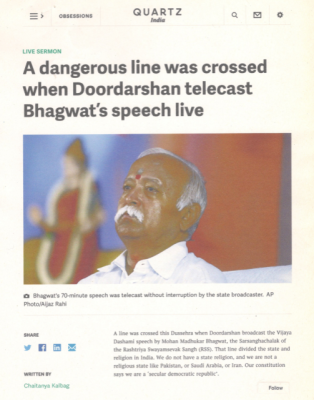A dangerous line was crossed when Door Darshan telecast Bhagwat’s speech live
Published date: 6-Oct-2014, Quartz India
View PDFA line was crossed this Dussehra when Door Darshan broadcast the Vijaya Dashami speech by Mohan Madhukar Bhagwat, the Sarsanghachalak of the Rastriya Swayamsevak Sangh (RSS). That line divided the state and religion in India. We do not have a state religion, and we are not a religious state like Pakistan, or Saudi Arabia, or Iran. Our constitution says we are a ‘secular democratic republic’.
freedom of expression does not dovetail with the absolutism of religion. Pope Francis is the head of 1.2 billion Roman Catholics but does not exercise temporal power. Nor is Bhagwat the sole pontiff of about 900 million Hindus. By giving him a televised pulpit that carried his 70-minute speech far beyond the thousands of men in black caps, white shirts and brown half pants wielding long staves who listened to him in rapt attention in the Reshmi Bagh Maidan in Nagpur, Modi’s government has made clear that all Indians may be equal, but Hindus are more equal than the others.
This supremacy is deceptive, because Hinduism is riven by divisions. If Hinduism were all-embracing, we would not have the problems that we have had with Jatis (castes) and varnas (classes). The RSS leadership, for instance, is dominated by the Desh Astha Brahmins. Although Bhagwat is 64 years old, the same age as Narendra Modi (the two men were born six days apart) he has a huge advantage over the prime minister. It would have been very difficult for Modi, had he continued in the RSS, even with his formidable talent and organizational skills, to rise to the top of the organization, because he does not belong to the top echelons of the Hindu caste ladder. Modi must see that to be a statesman, he must abjure religious overtones. For four and a half months, Modi has tried quite hard to tread a non-partisan line in all his public utterances, although he started his career as a humble RSS Karyakarte (worker). But Modi’s overwhelming personality does not sit well with the RSS. Bhagwat’s advantage is that he does not hold an elected office and can comment on everything, and he has not held back from reminding us that we are a Hindu nation.
The Vijaya Dashami speech is the annual State of the Hindu Rashtra statement, but never in the history of the 89-year-old RSS has it been propagated so instantaneously, so widely and so unquestioningly. In today’s Internet-savvy India, reaching every volunteer, or Swayamsevak, across more than 50,000 Shakha’s or branches could conceivably happen via a live webcast or podcast, but this was far more powerful. For the state-owned television broadcaster to give Bhagwat an hour and ten minutes, not interrupted by a single commercial, to deliver his sermon to a vast national audience over its huge terrestrial network sets a dangerous precedent. Make no mistake—Door Darshan’s autonomy is fictitious. Minister of State for Information and Broadcasting Prakash Javadekar was silent on Bhagwat’s speech, which lays the Modi government open to demands by every religious group in the country for airtime. Modi spoke for an hour from the ramparts of Delhi’s Red Fort on Independence Day. Today’s spectacle was designed to eclipse that patriotic event.
Ironically, Bhagwat upstaged Modi, who just over an hour later broadcast the first of his weekly radio talks, titled Mann ki Baat (from my heart) over state-owned All India Radio. Modi spoke for a modest fifteen minutes in a friendly, inclusive tone, encouraging his listeners to send him ideas and tune into future broadcasts which he said would move to Sundays. Bhagwat did not mention Modi’s radio talk, although Modi tweeted later that Bhagwat had raised “very relevant” issues. Among them must surely have been Bhagwat’s assertion that over the past thousand years, Bharat (India) has been the only nation to strive for peace, happiness and a beautiful world “through the path of truth and non-violence. Right from times immemorial to this moment, the unbroken current of national thinking that has prevailed in the vast region between the Himalayas and its extensions on one side and the sea on the other, [which] has been known as Hindutva”.
Yes, we are a Hindu-majority nation, and that is coming through in many ways under the new dispensation, from the vigilante ring-fencing of the dandiya-garba festivities in Madhya Pradesh and Gujarat, to the near-lynching of three blacks in a New Delhi metro station to cries of “Bharat Mata ki Jai” and “Vande Mataram”. These images do not go with a democracy partnering the US in counterterrorism, climate change and technology that aspires to be an economic superpower.
More directly than Modi has thus far, Bhagwat spelt out what he saw as the dangers posed by unbridled infiltration of “a particular community” into West Bengal and Assam, and “the serious upsurge in jihadi activities in the southern parts of Bharat, especially in Kerala and Tamil Nadu”. He saw a new horizon of victory looming “as our goal of developing Bharat into the guide and torch bearer of the whole world” and ended with a call for even greater propagation: “That is why we should take the Sangh Shakha to each home in every village, street and community.”
Not surprisingly, Bhagwat’s speech set social media a-flutter; some tweets argued that Door Darshan was merely ‘covering’ a news event. But this was not a garden-variety speech, and there was no reporter thrusting a microphone in Bhagwat’s face. This was the medium becoming the message.






